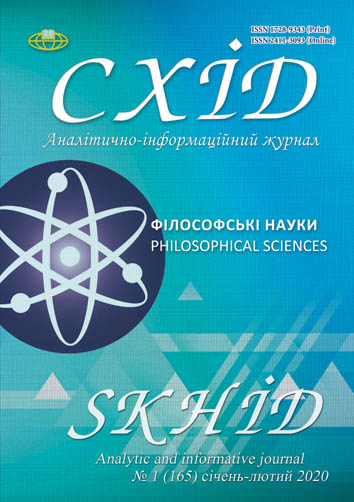Polish way to the information society
DOI:
https://doi.org/10.21847/1728-9343.2020.1(165).197415Keywords:
information society, Poland, transformations, Lisbon Strategy, European Strategy 2020Abstract
The article is devoted to a wide range of issues connected with the social and cultural changes that accompany the transition from industrial to information society. The aim of the issue is to demonstrate the Polish way to information civilization. Regarding this goal the author used the following methods: historical, behavior (indirect) analysis, decision making method as well as extrapolation and reflection. The issues of concepts’ specificity connected with the information society are discussed in the article. The specific nature of Polish society transformation in the context of external factors regarding European integration and global social processes in general is analyzed. The historical dynamic of Polish information infrastructure establishment has been presented; the way has been indicated as incomplete consequently the information transformations have not been completely accomplished in Poland.
Downloads
References
Cellary, W. (ed.) (2002). Streszczenie raportu o Rozwoju Społecznym Programu Narodów Zjednoczonych ds. Rozwoju. (In Polish)
Demczuk, A. (2016). Od raportu Bangemanna do Strategii Europa 2020. Rozwój społeczeństwa informacyjnego w polityce Unii Europejskiej - bilans 15 lat. Annales Universitatis Mariae Curie-Skłodowska, vol. XXIII, 2 sectio k: 25-44. (In Polish)
Dzeban, O., Aleksandrova, O., & Vinnikova, N. (2019). Axiological portrait of information society. Skhid, 5(163), 13-19. DOI: http://dx.doi.org/10.21847/1728-9343.2019.5(163).18243
Filas, R. (2010). Dwadzieścia lat przemian polskich mediów (1989-2009) w ujęciu periodycznym. Zeszyty Prasoznawcze, 3-4: 27-54. (In Polish)
Golka, M. (2005). Czym jest społeczeństwo informacyjne? Ruch Prawniczy, Ekonomiczny i Socjologiczny, 4: 253-265. (In Polish)
GUS (2019). Społeczeństwo informacyjne w Polsce w 2019 r. Retrieved from https://stat.gov.pl/obszary-tematyczne/nauka-i-technika-spoleczenstwo-informacyjne/spoleczenstwo-informacyjne/spoleczenstwo-informacyjne-w-polsce-w-2019-roku,2,9.html (In Polish).
Historia członkostwa Polski w UE (2012). Retrieved from http://polskawue.gov.pl/Historia,czlonkostwa,Polski,w,UE,52.html. (In Polish)
Kocikowski, A. (2009). Raz jeszcze o tzw. „społeczeństwie informacyjnym”, Społeczeństwo Informacyjne. Wybrane zagadnienia i problemy, 16: 107-124. (In Polish).
Komorowska, Ewa & Klimczak, Patrycja (2019). Strategia Lizbońska. Encyklopedia Zarządzania. Retrieved from https://mfiles.pl/pl/index.php/Strategia_Lizbo%C5%84ska
Krztoń, W. (2015). XXI wiek - wiekiem społeczeństwa informacyjnego. Modern Management Review, vol. XX, 22 (3): 101-112. (In Polish).
Marciński, W. (2012). Integracja przez Internet. Retrieved from http://kaszpir.hlds.pl/mail...com.../Integracja%20przez%20Internet.doc.1 (In Polish).
Niesporek, A. (2018). Społeczeństwo informacyjne w perspektywie socjologicznej, Retrieved from https://www.researchgate.net/publication/328562781_Spoleczenstwo_informacyjne_w_perspektywie_socjologicznej (In Polish).
Nowak, M. (2010). Działania obywatelskie a transformacja ustrojowa w Polsce. Ruch Prawniczy, Ekonomiczny i Socjologiczny, 1: 169-188 (In Polish).
Pawłowska, A. (2005). Społeczeństwo informacyjne, w: Encyklopedia wiedzy politycznej. Toruń; ss. 477. (In Polish)
Raport o Rozwoju Społecznym - Polska w drodze do globalnego społeczeństwa informacyjnego (2001). Retrieved from http://unic.un.org.pl/nhdr/2001/index.php?rok. (In Polish)
Stachowiak, Beata (2008). Rozwój społeczeństwa informacyjnego w krajach Unii Europejskiej a procesy globalizacyjne, Retrieved from https://www.researchgate.net/publication/236884483_Rozwoj_spoleczenstwa_informacyjnego_w_krajach_Unii_Europejskiej_a_procesy_globalizacyjne (In Polish).
Strategia Europa 2020 (2010). Retrieved from https://ec.europa.eu/eu2020/pdf/1_PL_ACT_part1_v1.pdf.
Downloads
Published
How to Cite
Issue
Section
License
Copyright (c) 2020 Lukasz Donaj, Vitaliy Zavadskyi

This work is licensed under a Creative Commons Attribution-NonCommercial-NoDerivatives 4.0 International License.
1. Authors bear responsibility for the accuracy of facts, quotations, numbers and names used.
2. Manuscripts are not sent back.
3. The publisher does not always agree with the authors' opinion.
4. The authors reserve the right to authorship of the work and pass the first publication right of this work to the journal under the terms of a Creative Commons Attribution-NonCommercial-NoDerivatives 4.0 International License. This license allows others to distribute (copy) the published work for non-commercial purposes, provided there is mandatory attribution to its authors and a link to the first publication in our journal.
5. The authors have the right to conclude separate supplement agreements that relate to non-exclusive work distribution in the form in which it has been published by the journal (for example, to upload the work to the online storage of the journal or publish it as part of a monograph), provided that the reference to the first publication of the work in this journal is included.

